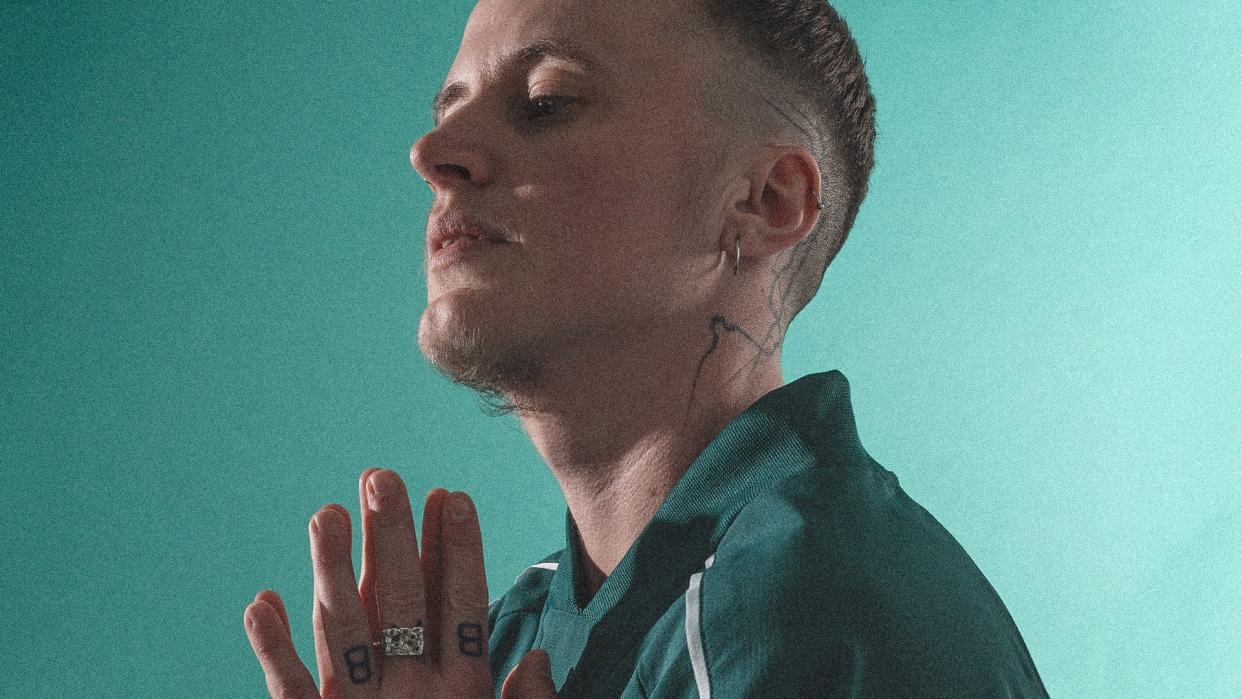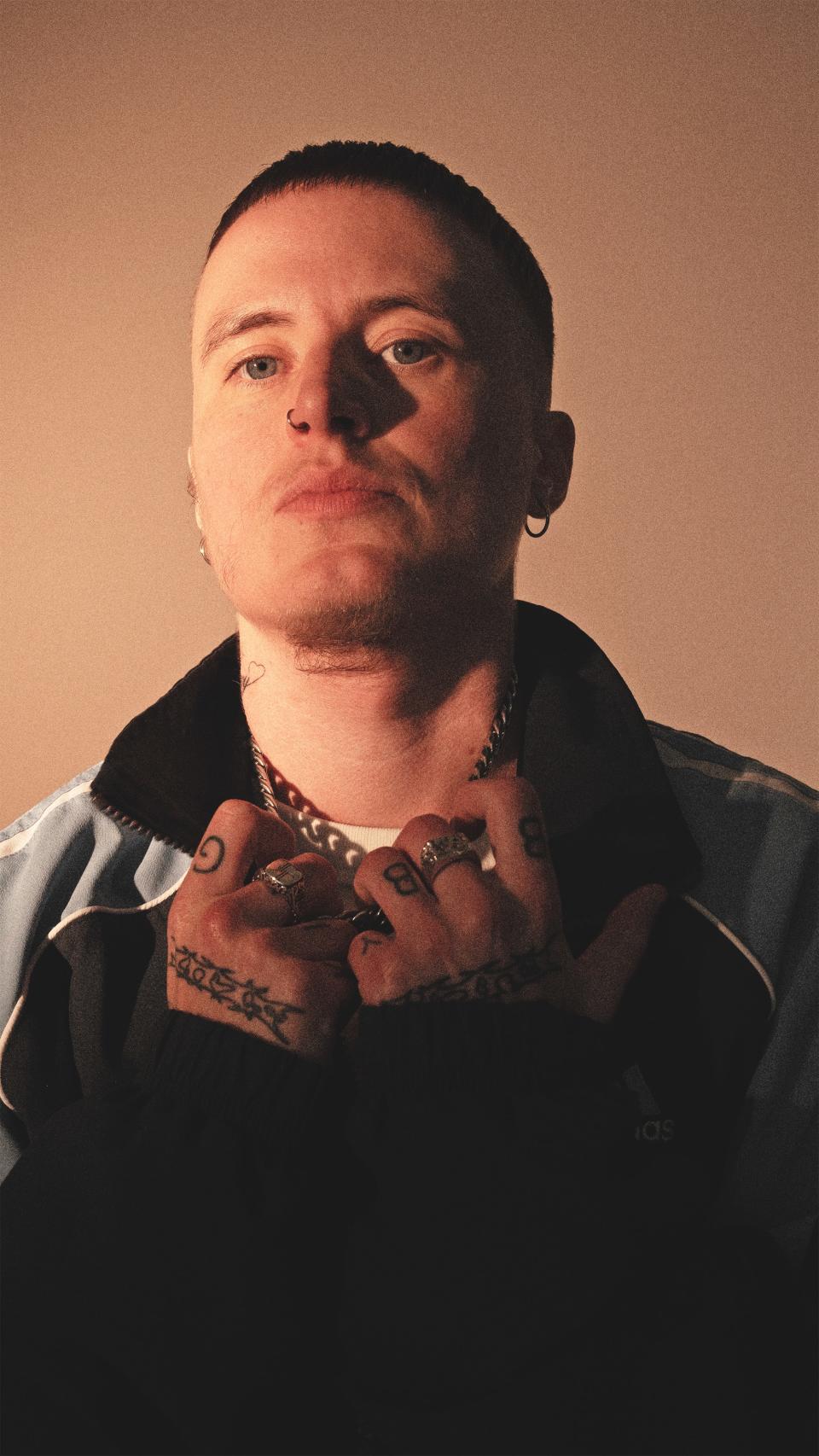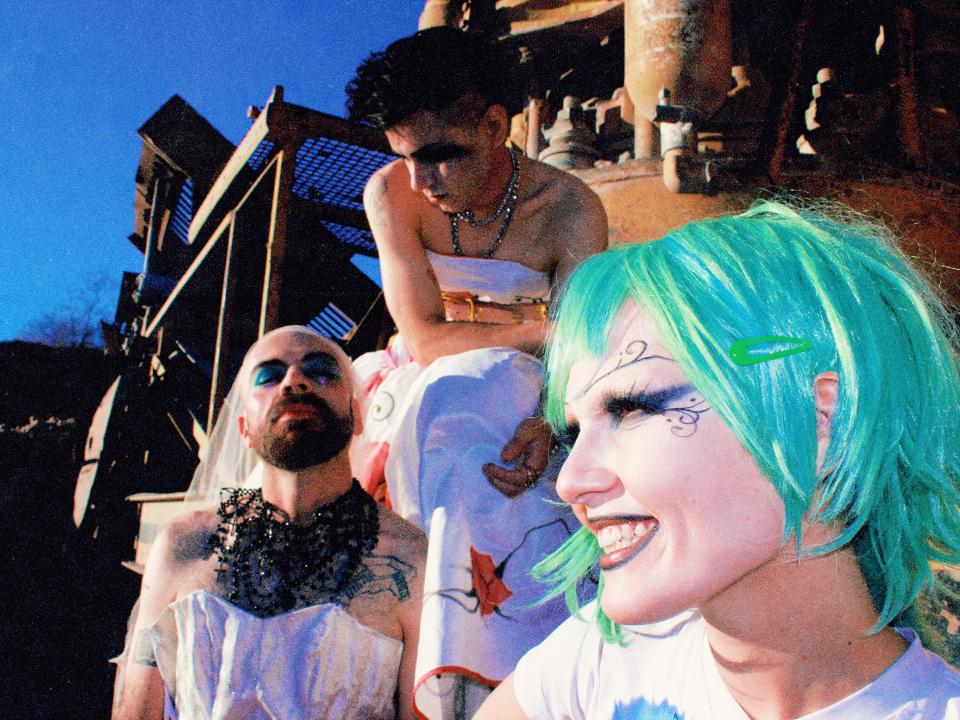I. Jordan’s Debut Album Was Born Amid the Pain of Being Deadnamed

- Oops!Something went wrong.Please try again later.
Kairo Urovi
For Jordan Tek, the British producer and DJ who performs as I. Jordan, there’s a lot in a name. Their euphoric 2020 debut EP For You garnered critical acclaim, but if you went back and read those glowing reviews now, you’d encounter Tek’s deadname, which they stopped using after coming out as trans. Their first full-length album, I Am Jordan, tackles the awkwardness and pain of transitioning in public head-on, drawing its title from an Instagram post the musician made after a weekend of hearing their previous name everywhere from a music festival to a professional panel to online comments sections.
“Everyone I know so far who is trans is out already and I don't know anything about them pre-transition,” Tek tells me. “It can feel quite lonely.”
But more than just a declaration of self amid that isolation, I Am Jordan is yet another testament to Tek’s mastery of classic U.K. dance traditions. Flitting effortlessly between chaos and serenity, the DJ grazes the edges of well-worn genres like techno and drum and bass while leaving their distinctive dreamy touch behind like a breadcrumb trail. Their prowess is all the more impressive considering that, until only recently, they were still working a nine-to-five job. Tek wanted to go full-time with music earlier in life, but financial constraints held them back. But even as they embark on this new leg of their journey, they remain rooted in their origins, infusing the album with “lowbrow” dance styles from their youth in Doncaster, like the divisive and irreverent “donk” and “scouse house.”
Album standout “Real Hot n Naughty” has a distinctly Northern working-class spirit, featuring Sex Education star Felix Mufti lending his own scouse Liverpoolian vocals on the cheeky track. The pair became friends after meeting at the U.K. queer party Homobloc, connecting over their shared working-class backgrounds. As the LP continues, Tek takes the listener on a journey that is at times frantic, humorous at times, meditative in more quiet moments, but never skimping on BPM. It’s a fitting representation of the euphoria they’ve unlocked as a producer, DJ, and trans artist.
“I definitely think I’ve grown as a producer,” they tell me. “I think I initially was really nervous about making an album and I didn’t think that I had it in me. I didn’t think I was a good enough producer to make one. The end product is me being like, ‘Actually, yeah, I can do this.’”
Below, I. Jordan speaks with Them about their debut LP, the joy of DJing in affirming spaces, and wanting to meet Elliot Page.
Your album feels like a primer on U.K. dance music. You’ve got drum and bass, rave, and most surprisingly donk. Can you talk about that?
I grew up on donk. It is a very working class Northern sound, and it’s all very tongue in cheek. It’s kind of a bit meme-y. But it’s very much a thing that you listen to when you’re a teenager. I think it’s just such an important part of my connection to working class Northern dance music. I was so happy to work with Felix Mufti, who has a very strong scouse Liverpoolian accent, on “Real Hot n Naughty,” and to make something that’s an homage to sort of a Northern working-class track.
How did you end up collaborating with Felix?
We met at a party about three years ago, [when he was] dancing at a party called Homobloc in Manchester. I had seen on his Insta that he does rap and stuff. From that, we started working together and became friends. As he was filming for Sex Education, he was sending me lyrics, then we got into the studio together in April last year to record [the track.] We drove together to Glastonbury and we sat in the car like, “Well, we need to do a music video for this.” He was like, “Let’s take over a bingo hall,” which is very much connected to mine and Felix’s upbringing. We really wanted it to be in that sort of space where we grew up — spaces where we didn’t necessarily feel comfortable. I used to work in a men’s club at home where I had to be just completely closeted. It felt very empowering for me to be in that space and feel totally myself.
“There’s been a big shedding of me over the years.”
Is it important for you to be transparent about your working-class background?
It’s important for me to talk about my [social background,] because you don’t really see many people from where I’m from make it onto a label. It’s made me who I am and I love it. I’m very proud to be from Doncaster, but I had a really shit time growing up. I’ve got my own childhood trauma from that. I didn’t have a great time at school and I left Doncaster as soon as I could, because it wasn’t a safe place for me. Whilst I’m heavily influenced by it, it still caused me a lot of grief. To put my own stamp on it and to recontextualize it is probably just me coming to terms with all that.

IJordan_inline
Kairo UroviWhat are the most affirming spaces for you to DJ in?
I have had the most affirming moments of my entire life UnFOLD, a queer biweekly party with a very large trans attendance. I’m just surrounded by my community [there] and the feeling is unlike anything else. It is such a contrast to some of the other shows that I do, where people are staring at me and they can’t tell if I’m a boy or a girl. Half the time, they’re just trying to clock me. They’re not really enjoying the music. UnFOLD, by contrast, is the complete opposite of that. Everyone is so incredibly euphoric and supportive. Someone said that my set made them cry, but in a good way. I also put on a party called I. Jordan and Friends back in November. The lineup was all-trans. I was unsure about what the crowd was going to be like. There were bros there, but the bros knew their place and all the queer people were at the front.
This album is confidently titled I Am Jordan. Do you feel the record represents you?
There’s been a big shedding of me over the years. I am very regretful that I have my deadname as my previous artist name, and that’s become something that has latched onto me. I think the fact that I’m calling the album I Am Jordan is connected to that [healing.]
It started back in the summer where I’d been deadnamed a few times over a weekend: once in a green room, then a festival wrote my deadname even though it’s all over my contract. Then, someone did it on Instagram. Then, finally the thing that broke me was I was on a panel and the person who was leading just deadnamed me in front of the whole audience. I was crying on stage trying to regulate myself afterward. I went to Instagram and I was nearly crying on the video, like, “You need to stop this. Do your research. Treat trans people better. This isn’t fair.” I called that [post] “I Am Jordan.” That’s where it all started.
Have these difficult experiences made you feel a bit isolated in your professional life?
I don’t know anybody personally who has been through a very public transition. Everyone I know so far that is trans is out already and I don’t know anything about them pre-transition. It can feel quite lonely.
Lead singer Ángel Ballesteros opens up about Myspace, raving in Mexico, and off-grid dreams.
Are there any role models you see as mentors?
Kae Tempest and Elliot Page. I was thinking about Elliot’s work — his face is everywhere, and it has been for 20 or so years. I’m talking about little old DJ me, but his work is momentous. He must have had to have done so much accepting that [deadnaming] just always going to be a part of it. Then, Kae, for a similar reason, has had a really similar sort of thing where they changed a bit of their name. I don’t know if either of them read Them, but if they do, can you tell them to message me?
I wanted to end by asking about the track “People Want Nice Things.” It stands out because it is so mellow and new agey compared to the rest of the album. Is this a special song for you?
It’s about being trans. When I was starting T, I wanted to record my voice to record the differences, but I didn’t just want to say, “Hi, my name is Jordan and I’m two months on T.” I wanted to do something a bit more memorable. So I recorded my voice saying “people want nice things” every month for 10 months when I started T. Then I put it into that track. I just wanted to celebrate my voice changing. I get a lot of dysphoria about my voice. That, to me, is in segue into trying to use my voice. Now I feel a bit more comfortable with it.
This conversation has been edited and condensed for clarity.
I Am Jordan is out now via Ninja Tune.
Get the best of what’s queer. Sign up for Them’s weekly newsletter here.
Originally Appeared on them.


